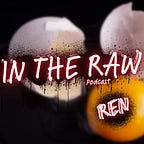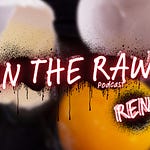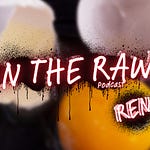In the second instalment of IN THE RAW this week, I’m talking to Mark Time about his new book, The Man in the Mirror, which is now available from Antelope Hill. Use the code “ren5” to get 5% off the book, or indeed any other book on the Antelope Hill site (including my own books like the Raw Egg Nationalism Cookbook, The Eggs Benedict Option and the MAN’S WORLD Annuals).
The Man in the Mirror tells the story of Joseph Arthur Blaine, an average Joe who seeks to transcend the limitations of his life and realise a different kind of destiny for himself. This is a wonderfully written novel, full of hope—something we definitely need more of. Mark is definitely a writer to watch.
Mark and I talk about the book and the writer’s journey and craft in detail.
You can read the first chapter of The Man in the Mirror below.
The Man in the Mirror: Chapter 1
He was an average Joe. An average is gained by dividing the total value of a body of data by the number of data points. Joseph Arthur Blaine was a data point, ever being divided and aggregated against the body. His ancestors grew up in times of immense prosperity. In those days, men competed for jobs against other men in their own town. In Joe’s day, he competed against the mighty throng of all humanity. The data field was much larger for Mr. Blaine.
Generally speaking, Joe avoided returning to his hometown in the heartland. Every time he did, it seemed a little more hollow, a little less friendly, a little more. . . . Joe couldn’t quite articulate it. All animals have a certain sense for impending doom. The decline was more easily observable after a period of absence. The longer Joe was away, the worse his hometown seemed to get. Despite his best attempts at denialism, the rot scintillated abject terror into his unspoken thoughts.
On his last visit home, he decided to visit the old mall. Most of the shops were shuttered. A few urban, streetwear clothiers plied their trade among those perennial last survivors of brick and mortar’s death: the supplement and soap shops. Everyone in the mall was a stranger to Joe. Not that he ever was acquainted with the regular attendees at the consumer temple, but this new crop seemed particularly . . . that same feeling Joe couldn’t articulate. The tender caress of the smooth jazz emulsified with the inhuman yelps of brawling youths next to the cinnamon roll bakery. Joe fled the mall to drive through the neighborhoods where his high school friends used to live. Many of the houses were now vacant. The town was hemorrhaging people due to flight and Naloxone doses that came just a little bit too late.
Where do they all go? Joe mused as he reflected that most towns in the heartland were like his own.
He now lived in MLK Jr. Country, a sort of amalgamation of several cities in southern California, which merged together as they expanded rapidly due to both foreign and domestic immigration. City counties like these exerted greater administrative control over the area than the previous layout of cities filled in with suburbs, ensuring a more equitable distribution of resources.
A reluctant surfer of Big Tech’s flowing tide, Joe’s own life was at slack water. The rent for “his” 850 square foot home occupied the lion’s share of his expenses. Joe was married to a gal he uprooted from the same hometown. Both made their hajj to the big city after they got married. The funny thing about pilgrimages is that one usually returns home afterwards. That gutted husk didn’t exist for Joe and his wife Jill anymore. The pickings in the big city seemed better than the assortment of minimum-wage distractions and asbestos-riddled huts in their hometown. If opportunity hadn’t already moved overseas, it was crammed among millions of teeming souls on the coast. The reality of their newly-acquired surroundings hit them just as they realized they could not afford to move again. Joe and Jill were in for the duration.
In their new location, their only sense of community consisted of going to a faceless megachurch and connecting virtually with the same friends they had back in college. The paradox of being lonely among millions crushed them. They both grew up as Christians and still went to church on occasion even in their new locale. A church Sunday was as follows: at 7:30 a.m. he’d jolt awake at his usual weekday wakeup time. By 7:31, he’d breathe a sigh of relief and return to sleep. A few hours later, Joe would wake up his wife and skip breakfast. Fighting traffic for thirty minutes on a nineteen-mile section of freeway eventually delivered them to Love Today Assembly. Upon entering the auditorium with thousands of nameless others, Joe would wince at the drums. At the conclusion of precisely three songs that sometimes mentioned Jesus, a thirty-something-year-old man wearing a flannel, skinny jeans, and a beanie hat entered the stage.
“Hey guys,” he would say into his slim ear mic, “who’s feeling God’s love this morning?!”
This exhortation was usually followed by cheers and affirmative drumming. After drifting into vague platitudes about being “a good person,” the pastor would exit stage left and drive away in a Mercedes S-Class while his minions collected tithe. Calling it church was perhaps an exaggeration, though Joe and Jill didn’t know any better.
Joe’s bungalow was rented from a national property acquisition company. His landlord did not have a name but rather went by Sun Street Homes. Sun Street owned half of the rental market, while Golden State Housing owned the other half. When searching for a home, his rent choices consisted of a majority of his income or a slightly smaller majority of his income in the “urban” part of town with the “bad school district.” Owning a home was out of the question when Sun Street and Golden State started bidding. His wife worked as a secretary in one of the skyscrapers downtown to make up the rest of the bills. Kids were on hold for the time being as their twenties ticked away. The years seemed to rack up faster than they could shovel away their collective mountain of debt.
“Just until we’re a little more settled,” they reassured themselves without any true definition of “settled.”
Joe was rootless. His city was interchangeable with a dozen others. On the one occasion he traveled abroad, he was filled with a deep sense of despair to learn that the “authentic” shops were selling the same Chinese goods as the stores back home. The skyline of his city was only recognizable by its slightly different arrangement of productivity prisms. Joe was much like his city. When he looked in the mirror, he had no discernible description besides what his overlords dictated to him. His height, weight, hair color, and eye color jumbled together in the stew of the unknown. His indistinguishable degree had been awarded to thousands before and after him. His resume more resembled excuses to hire him rather than reasons. Joe’s conditions were the result of carefully planned algorithms and think tanks. The sanitized life appointed to him bounced his shell along the guard rails toward the gutter at the end of the lane only to be recycled and bowled again.
Yet latent within him was something else he couldn’t articulate: shackled, tamed, castrated, domesticated, this force toiled within Joseph Blaine and tore at the fleshy walls of its prison to escape attempting to make contact at every turn, but the wax of social acceptability hardened into an exoskeleton around his soul. Joe avoided eye contact, kept his head down, and hoped he could slip through the cracks long enough to retire in four decades, but soon there would be an immolation of his personhood. The forbidden instincts within him would lay roots in the same way a great tree tunnels beneath a foundation and cracks it asunder.










